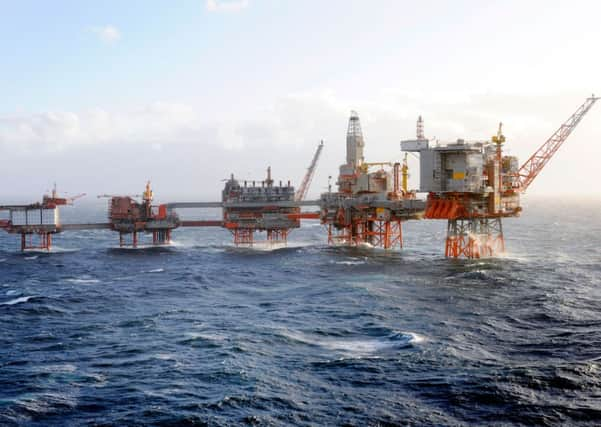North Sea oil industry shake-up calls


Oil & Gas Authority (OGA) chief executive Andy Samuel said a more competitive and efficient operating environment must be created if the economic potential remaining in the North Sea was to be realised.
The future of the oil and gas sector depends on collective leadership from the industry, the government and the authority, he said.
Advertisement
Hide AdAdvertisement
Hide AdThe report comes a day after the UK industry reported its worst annual performance in 40 years. Industry body Oil & Gas UK reported a negative cash flow of £5.3 billion in 2014 – the worst figure since the 1970s.
UK energy secretary Ed Davey announced last month that an urgent commission was being set up to consider the impact of plunging global oil prices on the North Sea. The price of oil fell to below $50 a barrel over the past six months, and is now hovering around $60 a barrel, raising doubts about the future of the offshore industry.
Dr Samuel published his initial findings yesterday. He noted that while the UK remains a substantial producer of oil and gas, and “significant” potential remains in parts of the North Sea, profit margins are on a steep downward trend, leading many firms to reduce new exploration, infrastructure investment and staffing over the past six months.
The report identifies the two most immediate risks facing companies operating in the area. The first is the danger that the profitability of current oil and gas fields will be insufficient to attract continued investment.
According to the report, this could lead to the premature decommissioning of North Sea infrastructure and lead to valuable oil and gas resources being left in the ground.
The resulting “domino effect” could have a negative impact on all areas of the industry, including employment and technological innovation.
The second identified risk is that a loss of confidence in the future potential of the UK Continental Shelf could result in the UK failing to secure the long-term investment needed to maximise economic recovery of North Sea oil and gas resources.
Dr Samuel said: “Significant hydrocarbon resources and economic value are yet to be delivered from the UK North Sea, but to unlock this potential we must create a more competitive and efficient operating environment, where costs are effectively managed and companies have the confidence to invest.
Advertisement
Hide AdAdvertisement
Hide Ad“I am working at pace to establish the OGA as a strong and effective regulator, which can be a catalyst for change and a facilitator of action. It will seek to drive performance and remove unnecessary barriers to help protect current oil and gas production and secure a positive future for the industry.”
The OGA said it would work with operating companies to protect critical infrastructure and complete rigorous economic assessments. It will require firms to prepare asset improvement plans and encourage a 30 per cent to 40 per cent improvement in operating efficiency.
It also recommends companies retain apprenticeship, trainee and graduate schemes, and ensure efficiency and cost reduction measures are sustainable.
But Dr Samuel said the authority cannot achieve the desired outcomes in isolation.
“I have highlighted the key risks facing the industry, priority actions required and my expectations on delivery.
“Now industry, government and the OGA must build on the positive tripartite relationship, which has developed since the publication of the Wood Review, to demonstrate collective leadership and deliver solutions. The future of our oil and gas industry depends on it.”
FOLLOW US
SCOTSMAN TABLET AND MOBILE APPS